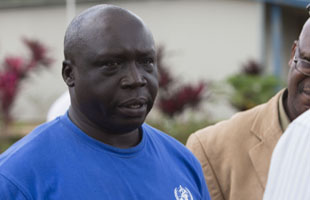You are here
 who.int - October 2014
who.int - October 2014
When Dr Peter Clements arrived in Lofa County, Liberia eight weeks ago, from the WHO country office in Monrovia, 20-30 patients were arriving at the MSF hospital with Ebola-like symptoms every day. People living in the community were afraid, civil unrest was simmering, and an ambulance and health workers were being targeted
Although UN security advised him not to, Dr Clements traveled the 12 hours over dirt roads to the area nearest the Guinea border. Once there, he walked into the hostile communities and went straight to the chiefs.
“In many years, you have not fought with these people,” he said. “Now you attack them. They are not the enemy, Ebola is the enemy. If we don’t chase Ebola, it will kill us. You have to know Ebola to fight Ebola. Mobilize your people. Let’s get to know Ebola.”
Dr Clements said the key to working with a hostile community is listening first. So he patiently listened to the community to understand their fears, then he started to explain about the virus and how people become sick, and people can prevent themselves.
Once they knew what Ebola was and how to stop it, they declared together “No more Ebola in our community from TODAY!”
Immediately, the people living in the community came up with their own plan that spread to all the households. They said:
- Ebola is a disease, not a curse, not a government plot. It is a disease.
- Those that are sick must be moved away from family and to the MSF clinic in Foya.
- No one could bury their loved ones anymore. Effective immediately they would call the people who do it safely.
- Although they are a very friendly people, there would be no more physical contact when greeting one another.
Dr Clement then carried the same approach around the county, community by community. Today, 30 formerly hostile villages are his best allies in the fight to stop Ebola here.
“They call us when anyone is sick,” he says. “We no longer have to go looking for the patients. The communities understand and they help us.”
The impact is significant. Today, there are only a few patients in the MSF clinic and it is the only place in the country an Ebola clinic is planning to downsize beds -- from 140 to 40.
No one is celebrating yet, it is too soon. But everyone stays vigilant to ensure that Foya remains on the right track towards ‘no more Ebola in the community’.



Recent Comments